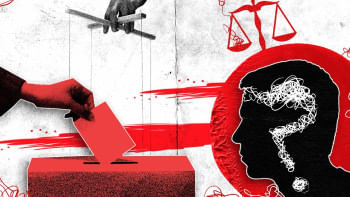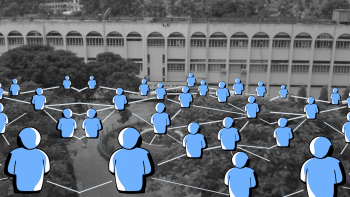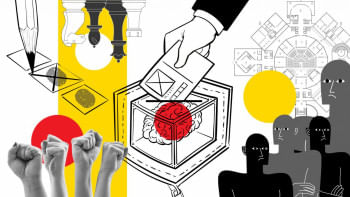‘Reforms are crucial to strengthen the Election Commission’

Badiul Alam Majumdar, secretary of SHUJAN: Citizens for Good Governance, speaks with Naznin Tithi of The Daily Star about the changes needed in our electoral system and related laws before the next election.
The chief adviser is supposed to present a roadmap for state reforms soon. What kind of reforms should be prioritised before the election, and how long should it take to implement them?
What I learned from the people who participated in the mass uprising is that they wanted justice for the criminal acts such as the killing of students and civilians, enforced disappearances, extrajudicial killings, violation of human rights, etc. They also wanted accountability for the financial crimes committed over the past 15 years. Another key demand of the students is state reform or raastro meramot. So, we are glad that the chief adviser is going to declare a roadmap after ongoing dialogues with the political parties. Once that roadmap is laid out, we will know what reforms they intend to undertake and how far they are willing to go.
Broadly speaking, I see two key areas where reform is required. One is the need to revise various laws, including those governing the appointment of members of the Election Commission (EC), the Anti-Corruption Commission, the Human Rights Commission, Information Commission, the local government, laws for appointing the judges, etc. These laws need to be updated and amended to reorganise both constitutional and statutory institutions. Another need is reforming the constitution, which is the most important and yet most difficult task.
Now, there are two alternative views. While some are opting for completely rewriting the constitution, others want changes in some key areas. These include bringing a balance between the powers of the president and the prime minister, reforming or abolishing Article 70, deciding on whether or not we should have a proportional representation system and bicameral legislation, establishing term limits for the prime minister, and setting the duration of the legislative term, etc. These are some of the major things that need to be addressed if we are not rewriting the constitution. We hope to get some sort of guidance on this from the chief adviser's forthcoming roadmap.
There are two ways to institute these reforms. One is by declaring the 15th amendment unconstitutional. In that case, the provision for referendums will come back. If that happens, it could be used for adopting some of the desired constitutional changes. Some laws could also be reformed, and the president could issue an ordinance to turn these into laws. But they will have to be approved in the first session of the parliament when it is formed. But you cannot change the constitution with an ordinance, so that will have to wait.
Now, the first round of dialogue is going on. There may be a second and even third round. After the chief adviser declares the roadmap, there will be further dialogues, through which an agreement among the political parties, government and other stakeholders can hopefully be reached. That agreement could be signed into a document, which can be called a National Charter. After the political parties sign the document, there could be a free and fair election. Then, whoever comes to power will be obliged to implement those reforms. However, our political parties don't have a good track record of keeping their commitments. So, there will have to be a body which will stand guard. I think our students could probably play this role.
But if we go for rewriting the constitution, then there has to be a constituent assembly through which a new constitution could be adopted.
What, in your view, can be a reasonable timeframe for polls?
The timeframe for the election will depend on what the political parties and the interim government agree on doing. It will depend on what milestones the interim government would like to achieve first. The good thing is that discussions are currently underway, which we hope will result in a timeframe agreed upon by all stakeholders involved.
The political parties have also proposed to hold the local government elections before the national polls.
Our local government system is in a bad shape. Also, some of the local government bodies that are very important for providing services to the people have been dissolved. So, elections to these bodies should be held as soon as possible for practical reasons. This will give the interim government, and a reconstituted EC, the experience required for holding the national election. The local elections will not be as contentious, because they will not cause changes in power. But before these elections are held, the local government laws should be reformed.
What kind of reforms are needed in our electoral system and in the Election Commission laws to make the system foolproof, so that the EC can hold elections independently in the future?
There is nothing we can do to make the electoral system foolproof because it does not depend fully on the EC, even though it is the biggest and most important stakeholder in case of elections. The other stakeholders are the political parties and their candidates, law enforcement agencies, bureaucracy, civil society, and media. If political parties and their candidates do not abide by the laws, and if the law enforcing agencies and bureaucracy are partisan, then the EC cannot really do much. Having said that, the EC can prevent/stop bad elections because its constitutional mandate is to hold an inclusive and competitive election.
However, there are quite a few areas where reform is vital to strengthen the Election Commission. First, we need to reform the law enacted in 2022 for appointing election commissioners. This law was basically recycled from the old circulars that the Awami League government used in the last few elections to appoint the commissioners of their choice. We need to do away with this law. Incidentally, the legality of the appointment of the now-former Election Commission is in serious question. Because the 2022 law calls for only political parties and professional bodies to propose names to the search committee for the appointment of election commissioners. But the search committee, in violation of the law, allowed all citizens to propose names, including their own. For example, Kazi Habibul Awal's name was proposed by the late Zafrullah Chowdhury. Although he was a distinguished person, he was not qualified as per law to nominate anybody. A similar thing happened in the case of other commissioners. Therefore, we need to reform this law to reconstitute the EC. However, because of the unusual situation caused by the mass upsurge, the interim government should be able to appoint a new EC without following the existing law or enacting a new one.
We also need to make quite a few changes in the Representation of the People Order (RPO). For example, according to section 90B of the RPO, political parties registered with the EC must not have provisions for associated and affiliated bodies in their constitutions. This was intended to disband such bodies. Our political parties removed such provisions from their constitutions but kept those affiliated bodies by terming them as "brotherly" organisations so as to use them as their lathiyal bahinis. Thus, our political parties adhered to the letter but not the spirit of the law. To remedy this, section 90B of the RPO needs amendment.
Moreover, the nomination trade has become a big concern as it allows people to buy nominations in exchange for money. Consequently, more than two-thirds of our parliamentarians were businessmen. As a result, we now have the "best" democracy money can buy. Redressing this will require amending section 90B of the RPO, requiring the nomination of candidates for parliament elections to be determined by the votes of the activists of each constituency.
In addition, a few more changes are needed with regards to the candidates' affidavits, which must be scrutinised. There must also be provisions for counter-affidavits so that one can challenge the affidavit of a candidate. Furthermore, the present outdated affidavit form needs to be updated, and election expenses should be scrutinised and monitored. All these must be included in the law.
Additionally, we need a constitutional change if we want a proportional representation system. We will need constitutional changes for women's representation in parliament, to hold direct elections for the women's seats, and to preserve at least a third of the seats for women. Constitutional changes will also be needed if we want to go for a bicameral legislature and set term limits for the prime minister.
What's your thoughts on the proportional representation system that some parties have suggested?
Proportional representation means that political parties will get the seats based on the proportion of votes they get. So, if a party gets 50 percent of the votes, it will get 50 percent of the seats. If we go for this system, it will prevent the monopoly and tyranny of the majority. In 2008, the BNP received about 33 percent of the votes but got only 10 percent of the seats. In a proportional system, the BNP would have had more seats. So, this system should be seriously considered.
Follow The Daily Star Opinion on Facebook for the latest opinions, commentaries and analyses by experts and professionals. To contribute your article or letter to The Daily Star Opinion, see our guidelines for submission.

 For all latest news, follow The Daily Star's Google News channel.
For all latest news, follow The Daily Star's Google News channel. 







Comments